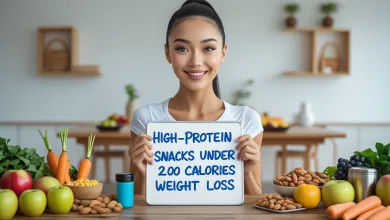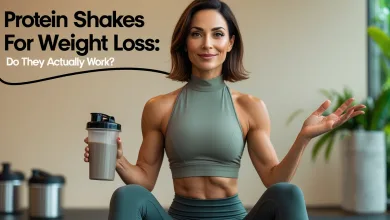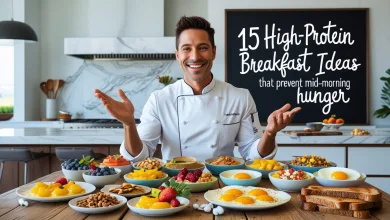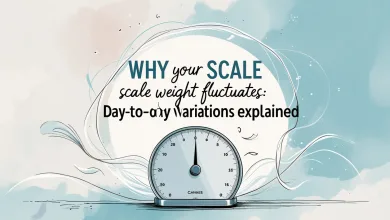Best Protein Sources for Weight Loss: Complete Guide
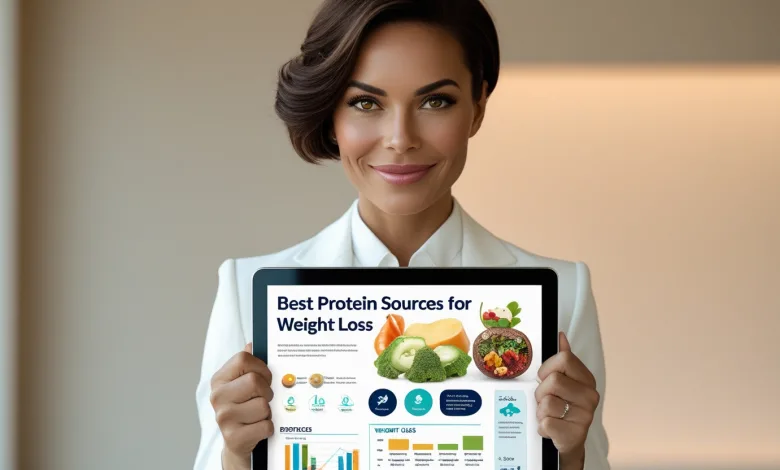
Looking to shed those stubborn pounds? Protein might just be your secret weapon. In this complete guide, we’ll explore the best protein sources for weight loss and how to incorporate them into your daily routine for maximum results.
Why Protein Is Your Weight Loss BFF
You’ve probably heard it a million times – protein is essential for weight loss. But why’s that? Well, it’s not just fitness influencers trying to sell you protein powder. There’s solid science behind it.
Protein is the ultimate multitasker when it comes to weight management. First off, it keeps you feeling full longer than carbs or fats, which means you’re less likely to raid the fridge at midnight. This satiety factor isn’t just anecdotal – research published in the American Journal of Clinical Nutrition found that increasing protein intake from 15% to 30% of total calories significantly reduced hunger and led to automatic calorie reduction.
But that’s not all! Your body actually burns more calories digesting protein than it does processing carbs or fats. This is called the thermic effect of food (TEF), and protein’s TEF is a whopping 20-30%, compared to 5-10% for carbs and 0-3% for fats. What does this mean in plain English? For every 100 calories of protein you eat, your body uses 20-30 calories just to process it!
How Much Protein Do You Actually Need?
Let’s cut to the chase – how much protein should you be consuming if weight loss is your goal? The answer isn’t one-size-fits-all, but I can give you some solid guidelines.
The Recommended Dietary Allowance (RDA) for protein is 0.8 grams per kilogram of body weight. But hold your horses! That’s just the minimum to prevent deficiency, not the optimal amount for weight loss. For those looking to shed pounds while preserving muscle mass, research suggests aiming higher – between 1.2 and 2.0 grams per kilogram of body weight daily.
To put that in perspective, if you weigh 150 pounds (68 kg), you’d need between 82 and 136 grams of protein daily when trying to lose weight. That might sound like a lot, but don’t worry! I’m about to share the best protein sources that’ll help you hit those targets without blowing your calorie budget.
Top Animal-Based Protein Sources for Weight Loss
Animal proteins are complete proteins, meaning they contain all nine essential amino acids your body can’t produce on its own. Here’s the cream of the crop when it comes to animal proteins for weight loss:
Lean Poultry: The Weight Loss Classic
Chicken and turkey breast are weight loss staples for good reason. They’re incredibly protein-dense while being low in calories. A 3.5-ounce (100-gram) serving of skinless chicken breast provides about 31 grams of protein for just 165 calories.
What makes poultry particularly effective for weight loss is its versatility. You can grill it, bake it, add it to salads, stir-fries, or wraps… the possibilities are endless! Pro tip: cook a batch of chicken breasts on Sunday, and you’ll have lean protein ready to add to meals throughout the week.
Fish and Seafood: Omega-3 Bonus
If you’re not incorporating fish into your weight loss diet, you’re missing out big time! Fish like salmon, tuna, and cod are not just excellent protein sources but also provide heart-healthy omega-3 fatty acids that can actually help with fat loss.
Take wild-caught salmon, for instance. A 3.5-ounce serving delivers about 22 grams of protein and is rich in omega-3s that have been shown to boost metabolism and reduce inflammation. Even better, white fish varieties like cod and tilapia offer lots of protein with very few calories – about 20 grams of protein per 3.5 ounces with just around 100 calories!
Eggs: The Perfect Protein Package
Eggs might be small, but they’re mighty when it comes to weight loss nutrition. One large egg contains about 6 grams of high-quality protein and just 70 calories. And contrary to old-school nutrition advice, you should definitely eat the yolk – that’s where many of the nutrients are!
Research has shown that eating eggs for breakfast can help you feel fuller longer and consume fewer calories throughout the day. A study published in the International Journal of Obesity found that overweight participants who ate eggs for breakfast lost 65% more weight than those who ate a bagel breakfast with the same calorie count.
Dairy: Not Just for Strong Bones
Greek yogurt, cottage cheese, and other low-fat dairy products deserve a spot in your weight loss meal plan. Greek yogurt, in particular, is a protein powerhouse, packing about 17 grams per 6-ounce container.
Cottage cheese is another unsung hero, offering about 28 grams of protein per cup. These dairy options are perfect for quick snacks or breakfast, and research suggests the calcium they provide might also play a role in fat metabolism.
Plant-Based Protein Powerhouses for Weight Loss
Don’t worry, plant-based eaters – you can absolutely crush your protein goals while losing weight! Here are the best plant protein sources to include in your diet:
Legumes: Fiber + Protein Combo
Lentils, chickpeas, black beans, and other legumes offer a one-two punch of protein and fiber that’s gold for weight loss. One cup of cooked lentils provides about 18 grams of protein and 15 grams of fiber for just 230 calories.
The fiber in legumes helps slow digestion, keeping you full longer and stabilizing blood sugar levels. This is super important for preventing those hunger spikes that can lead to snacking. Research published in the American Journal of Clinical Nutrition found that adding legumes to your diet can increase fullness by 31%.
Tofu and Tempeh: Soy Sensations
Derived from soybeans, tofu and tempeh are complete plant proteins that are incredibly versatile. Half a cup of tofu provides about 10 grams of protein, while the same amount of tempeh offers around 15 grams.
What makes these soy products particularly good for weight loss is their adaptability – they absorb the flavors they’re cooked with, making them perfect for everything from stir-fries to smoothies. Plus, research suggests that soy protein may help reduce belly fat specifically.
Quinoa and Other Protein-Rich Grains
Quinoa stands out as a grain because it’s actually a complete protein, containing all nine essential amino acids. One cup of cooked quinoa provides about 8 grams of protein along with complex carbs and fiber.
Other grains like amaranth, farro, and teff are also surprisingly good protein sources. They make excellent replacements for lower-protein grains like white rice in your meals, giving you more nutritional bang for your buck while keeping you satisfied longer.
Nuts and Seeds: Small but Mighty
Don’t let their small size fool you – nuts and seeds pack a serious protein punch! Hemp seeds contain a whopping 10 grams of protein per 3 tablespoons, while the same amount of chia seeds offers about 5 grams along with tons of fiber.
Almonds, pumpkin seeds, and pistachios are also excellent options. Just be mindful of portions, as nuts and seeds are calorie-dense. A good strategy is to use them as toppings for salads, yogurt, or oatmeal rather than mindlessly snacking on them.
Protein Powders: Convenient Weight Loss Allies
In our busy world, sometimes whole food protein sources aren’t convenient. That’s where protein powders can be a helpful addition to your weight loss arsenal.
Whey Protein: Fast-Absorbing Animal Option
Whey protein is derived from milk and contains all essential amino acids. It’s quickly absorbed, making it ideal for post-workout recovery. Research has shown that whey protein can help preserve lean muscle mass during weight loss and may boost metabolism.
A typical scoop of whey protein powder provides about 20-25 grams of protein for roughly 100-130 calories, making it an efficient way to boost your protein intake without adding many calories.
Plant-Based Protein Powders: Vegan Options
For those avoiding animal products, plant-based protein powders like pea, hemp, and brown rice protein are excellent alternatives. While single plant proteins may not be complete on their own, blended plant proteins often combine complementary sources to provide all essential amino acids.
Look for options with minimal added sugars and ingredients you recognize. And remember – protein powders are supplements, not replacements for whole foods. They’re best used as a convenient boost when whole food options aren’t practical.
Smart Strategies for Incorporating Protein into Your Diet
Knowing what to eat is only half the battle – you also need to know how to incorporate these protein sources into your daily routine. Here are some practical tips:
Balance Your Protein Throughout the Day
Rather than loading up on protein at dinner, aim to spread your intake throughout the day. Research suggests that distributing protein evenly across meals (about 20-30 grams per meal) optimizes muscle protein synthesis and keeps hunger at bay all day long.
A balanced approach might look like:
- Breakfast: Greek yogurt with berries and nuts (20g protein)
- Lunch: Chicken salad with quinoa (25g protein)
- Snack: Cottage cheese with fruit (14g protein)
- Dinner: Baked salmon with lentils and vegetables (25g protein)
Meal Prep Like a Pro
Let’s be real – when you’re hungry and tired, you’re more likely to grab whatever’s easiest (hello, drive-thru!). Combat this by prepping protein-rich options in advance.
Some easy prep ideas include:
- Hard-boiled eggs
- Grilled chicken strips
- Portioned containers of Greek yogurt
- Prepared lentil or bean salads
- Protein energy balls (made with protein powder, oats, and nut butter)
Dedicate a couple of hours each weekend to prep these items, and you’ll set yourself up for weight loss success all week.
Sneaky Ways to Add More Protein
Sometimes you need to get creative to hit your protein targets. Try these protein-boosting hacks:
- Add a scoop of protein powder to your morning oatmeal
- Mix Greek yogurt into your sauces and dressings
- Swap regular pasta for edamame or chickpea pasta
- Use high-protein flours (like almond or chickpea) in baking
- Sprinkle hemp seeds on literally everything (salads, yogurt, smoothies)
Common Protein and Weight Loss Myths: Busted!
There’s a lot of misinformation out there about protein and weight loss. Let’s set the record straight on some common myths:
Myth #1: “Too Much Protein Damages Your Kidneys”
For healthy individuals, there’s no evidence that high-protein diets cause kidney damage. This myth likely stems from the fact that people with pre-existing kidney disease need to limit protein. However, research has consistently shown that healthy kidneys can handle higher protein intakes without issue.
Myth #2: “Plant Proteins Are Incomplete and Inferior”
While it’s true that many individual plant proteins don’t contain all essential amino acids in optimal ratios, eating a variety of plant proteins throughout the day easily provides all the amino acids your body needs. Research shows that well-planned plant-based diets can support weight loss and muscle maintenance just as effectively as omnivorous diets.
Myth #3: “Protein Makes Women Bulky”
Ladies, I promise that adding more protein to your diet won’t suddenly turn you into a bodybuilder! Women typically don’t have the testosterone levels to build massive muscles without dedicated training and specific nutrition plans. What protein will do is help preserve your lean muscle as you lose fat, giving you that toned, defined look many women desire.
FAQs About Protein for Weight Loss
Can I eat too much protein?
Yes, it is possible to consume too much protein. While there’s no clear-cut maximum, extremely high protein intakes (above 2.5g per kg of body weight) don’t provide additional benefits for most people and may displace other important nutrients. Plus, excess protein beyond what your body can use for muscle preservation and other functions will be converted to glucose or fat. Stick to the recommended 1.2-2.0g per kg for weight loss purposes.
Is animal protein better than plant protein for weight loss?
Not necessarily. Both animal and plant proteins can effectively support weight loss. Animal proteins are typically complete (containing all essential amino acids) and more calorie-efficient (more protein per calorie). However, plant proteins come packaged with fiber, antioxidants, and phytonutrients that support overall health and weight management. The best approach is often a mix of both, but well-planned exclusively plant-based diets can be equally effective.
Will protein help me lose belly fat specifically?
While no food targets fat loss from specific body areas (spot reduction is a myth), higher protein diets do appear to help reduce abdominal fat. A study in the Journal of Nutrition found that participants who ate more protein had significantly less belly fat over a 5-year period. This may be related to protein’s effect on insulin and other hormones that influence fat storage patterns.
Should I use protein supplements if I’m trying to lose weight?
Protein supplements aren’t necessary for weight loss if you can meet your protein needs through whole foods. However, they can be a convenient option when whole food sources aren’t available or practical. If you do use supplements, look for options with minimal added sugars and ingredients you recognize, and use them to supplement, not replace, whole food protein sources.
The Final Protein Prescription
We’ve covered a lot of ground here, from why protein is crucial for weight loss to the best sources and how to incorporate them into your diet. Now it’s time to put this knowledge into action.
Remember, sustainable weight loss isn’t about drastic measures or quick fixes—it’s about making informed choices that you can maintain long-term. Prioritizing protein is one of those smart choices that science consistently supports.
Start by calculating your personal protein target based on your weight and goals. Then, gradually adjust your meals to include more of the protein sources we’ve discussed. Pay attention to how your body responds—you’ll likely notice improvements in satiety, energy levels, and yes, the number on the scale.
The beauty of focusing on protein for weight loss is that it’s not about restriction—it’s about addition. By adding more protein-rich foods to your diet, you naturally crowd out less nutritious options and support your body’s fat-burning potential.
So go ahead—power up your plate with protein and watch as it powers up your weight loss journey too!


